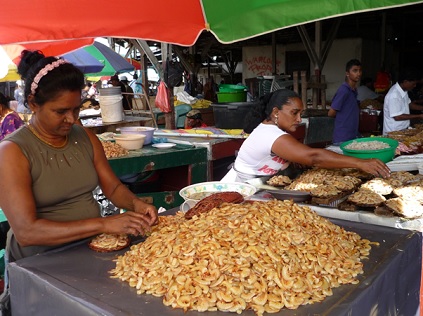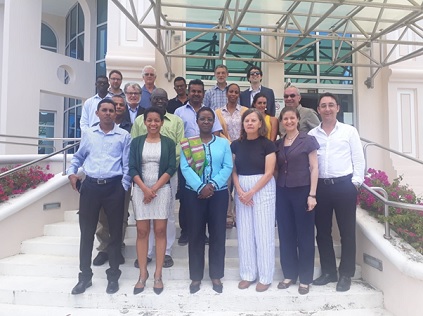Second meeting of the WECAFC/CRFM/IFREMER working group on Shrimp and Groundfish of the North Brazil Guianas Shelf
UN House, Barbados 17-18 May 2018
The Shrimp and Groundfish Fisheries of the North Brazil Guianas Shelf are critical for local employment, food security and international trade but require a regionally coordinated effort if they are to transform into sustainable fisheries.
Such was the main conclusion of the second meeting of the WECAFC/CRFM/IFREMER Working Group on Shrimp and Groundfish Fisheries held 17-18th of May 2018 at the FAO Sub-regional Office for the Caribbean in Barbados. The working group gathered fifteen experts representing governments, private sector, civil society and research institutions of Brazil, French Guyana, Guyana, Suriname, Trinidad and Tobago, United States and regional and international organizations tasked with evaluating the status of shrimp and groundfish fisheries in the region and provide recommendations for action to the Western Central Atlantic Fishery Commission (WECAFC).
The scope of the Working Group’s tasks is to provide scientific and management advice for the sustainable management of the shrimp and groundfish resources of the Northern Brazil-Guianas shelf in the WECAFC Region. In undertaking its work, the working group will pay due attention to article 6.4 of the Code of Conduct for Responsible Fisheries and pursue recommendations in line with the Ecosystem Approach to Fisheries.
 Photo of the sector Source: Tomas Willems-Suriname. |
Using a multidisciplinary approach, the working group provides management advice to Members of WECAFC based on the best available knowledge. In pursuing this goal, the working group contributes to the fulfilment of national and regional commitments under the Strategic Action Programme for the North Brazil Shelf Large Marine Ecosystem and in accordance with agreed, documented management goals.
The objectives of this session of the working group were the following:
- Evaluate status of socio-economic and biological data for these fisheries and identify the most pressing data needs for successful management.
- Evaluate the latest progress on the management of the shrimp and groundfish fisheries.
- Provide recommendations on a draft regional strategy for bycatch management
- Review steps and propose actions and investments to develop and implement a regional management plan for shrimp and groundfish.
The Working Group experts agreed on a wide range of recommendations to be reviewed by the Scientific Advisory Group then proposed for endorsement by the 17th Session of WECAFC. The recommendations include a call to WECAFC Members and partners to include priority species of the North Brazil-shelf in the regional fishery database developed by a partnership that includes FIRMS, WECAFC and NOAA. The Working Group also noted the critical need to urgently increase basic data collection for groundfish species as well as renew efforts to collect socio-economic data in the region.
For Fabian Blanchard responsible of the research unit of IFREMER in French Guiana and Working Group Convener, the work of this group of experts is “crucial to overcome the lack of shared data and preponderance of illegal, unreported and unregulated fishing in artisanal fisheries of the North Brazil-Guianas Shelf. These fisheries are critical for food security local development and employment, but the lack of data and knowledge is an obstacle for their management”
The Working Group also strongly recommended Members, national and regional organizations to urgently increase the capacity of countries to carry out stock assessments for the region’s priority fishers. According to the information presented during the working group, very few fisheries have had stock assessments in the last 10 years. In this context, participants agreed to share samples of priority species with IFREMER so that the latter can conduct genetic analysis to determine the status and distribution of stocks in the region.
“Working group allows an opportunity for the artisanal fleet of the North Brazil-Guianas Shelf to express its recommendations to other groups in the region” said Mark Lall- representative of the Caribbean Network of Fisherfolk Organizations and Suriname -, “this ensures that any regional activities consider the thoughts and views of fisher organizations”.
Given that many of the main targeted species are transboundary, the working group also recommended the development of a sub-regional management plan based on an Ecosystem Approach to Fisheries. The plan, which must be based on the national management plans currently under development, will be supported by the CLME+ Project.
Finally, the working group recommended further work and national consultations on a draft regional strategy for bycatch management. This strategy is being developed under the context of the project on Sustainable Management of Bycatch in the Bottom/Shrimp Trawl Fisheries of Latin American and Caribbean (REBYC-II LAC). The strategy is a regional consensus on the steps required to minimize bycatch and discards in shrimp/bottom trawl fisheries, which are often targeted for their perceived high impact on non-target species.
 Working group participants Source: Tomas Willems-Suriname. |
